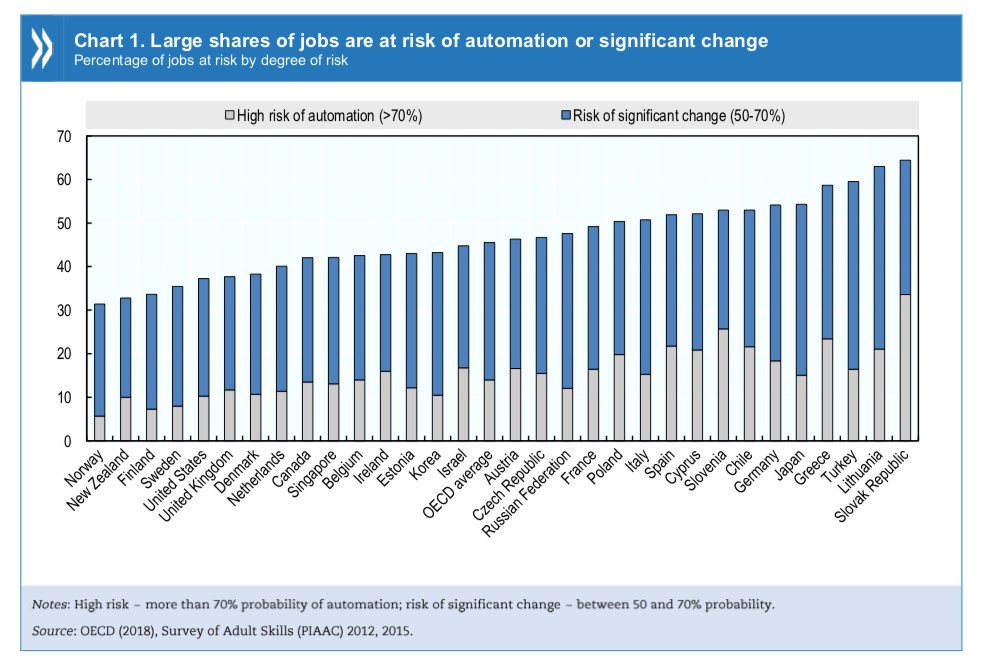The risk of artificial intelligence in the workforce is more the “risk” of change than it is of usurping humans, according to a report from the Organization for Economic Co-operation and Development (OECD). But when it comes to whether or not you should fear automation in the workforce depends specifically on who you are.
Just last year, a study came out claiming that in the next two decades, some 800 millions could be lost due to AI-inspired automation. That’s almost one-third of global workforce, but the devil is in the details—as always.
With a calmer outlook, the majority of studies since then have traded in terms like “take-over” for ones like “modification” or “change”.
The study by the OECD--a club of mostly rich countries--says that 14 percent of members countries are highly automatable, while another 32 percent of jobs could face substantial change over the next decade or two.

(Click to enlarge)
According to the study, automation mostly affects manufacturing and agriculture, but some service sector jobs are also highly automatable as well.
As expected, low skilled workers are at the highest risk level. Occupations with the highest risk of will be more concentrated in jobs such as food preparation assistants, cleaners, and laborers in mining, transport, construction and manufacturing.
That also means that the most at-risk age groups are the young and old, not the middle. Young people combine studying with working low-level occupations, while older people are struggling to keep up with new technology and risk being sidelined. Statistics show that only 10 percent of adults aged 55–65 are able to complete new multiple-step technological tasks.
But there are also plenty of jobs that are still safe—for now. No one’s ready to let a robot babysit their children, and while automation can assist with efficiency in hospitals, schools and elsewhere, occupations such as doctors, nurses and teachers aren’t going anywhere. Related: Tech Crunch Drags Markets Lower
The big question is: What are countries doing to make sure their workforces are prepared for what comes next?
When it comes to low-skilled workforces, the answer is: Not enough, according to the OECD.

(Click to enlarge)
Workers who aren’t trained face replacement by AI advancements, and pushing large numbers of unemployed adults onto the streets would be a major social disaster.
What about wages, then? According to the OECD, “workings in jobs with a high risk of automation have lower hourly earnings in most countries. On average a 10% higher risk of automation corresponds to a 4.3% decrease in hourly earnings”.
In other words, “those at risk of automation are often already in a vulnerable position in the labour market, which may be exacerbated as automatization progresses.”
And as with all big, new ideas, over time people come to terms with them. Many agree that this isn’t a take-over story, it’s a story of positive progress—even if it won’t be progressive for everyone.
New technologies have the potential to free up workers to do more productive and less routine jobs and provide better service to customers. In other words, the jobs themselves won’t entirely vanish; rather, they will be redefined.
Related: The Intrinsic Value Of Gold-Backed Cryptos
Last year’s study by Deloitte on automatization in United Kingdom find that 800,000 low-skilled jobs were eliminated as a result of AI and other automation technologies. However, at the same time, 3.5 million new jobs were created paid on average nearly $13,000 more per year than the ones that were lost.
In United States alone, currently there is labor shortage with reports of employers’ difficulty in finding qualified workers at a time when there are 6.7 million job openings. Since 2010, the U.S. has added almost 19 million new jobs and the labor pool hasn’t kept pace in numbers or skill.
With unemployment in US is near historic lows, it seems that market is not worried by the 2013 findings from the Oxford University researchers who said that “47 percent of U.S. workers have a high probability of seeing their jobs automated over the next 20 years.”
By David Craggen for Safehaven.com
More Top Reads From Safehaven.com:

















We will NOT be getting rid of hand repair wrk unless we just stop repairing things, and that may come to pass as well. Lots and lots of repair jobs are emotionally driven, not cost effective.